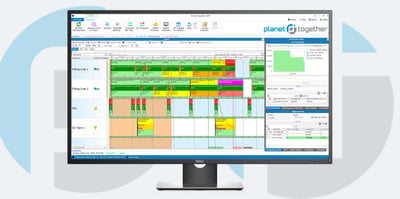Complex Production Systems
Supply chain managers in packaging manufacturing face an ever-evolving challenge: optimizing complex production systems. With the intricate interplay of raw materials, production processes, and distribution networks, achieving seamless operations requires a strategic approach backed by cutting-edge technologies.
In this blog, we look into the intricacies of optimization and explore how integration between advanced planning and enterprise resource planning (ERP) systems can revolutionize production efficiency.

Understanding the Complexity
Packaging manufacturing is a multifaceted process, involving various stages from procurement of raw materials to final product delivery. Each step in the production cycle presents its own set of challenges, ranging from inventory management to production scheduling and distribution logistics. The complexity intensifies further in facilities where multiple production lines operate concurrently, catering to diverse product portfolios and market demands.
Challenges in Optimization
Production Planning and Scheduling: Balancing production schedules with fluctuating demand patterns, inventory levels, and resource constraints is a daunting task for supply chain managers. Manual planning processes often lead to inefficiencies, such as underutilized capacity, excessive lead times, and production bottlenecks.
Inventory Management: Maintaining optimal inventory levels while minimizing holding costs and stockouts requires real-time visibility into supply chain dynamics. Inaccurate demand forecasts, supplier delays, and production disruptions can lead to inventory imbalances, impacting both cost and customer satisfaction.
Resource Allocation: Efficient utilization of resources, including raw materials, equipment, and manpower, is critical for maximizing productivity and minimizing production costs. However, without robust optimization tools, resource allocation decisions may be suboptimal, leading to idle capacity or overburdened assets.
Distribution Logistics: Timely delivery of finished products to customers necessitates streamlined distribution networks and efficient transportation management. Complex routing, warehousing constraints, and last-mile challenges can impede delivery performance, affecting customer service levels and brand reputation.

Integration for Optimization with PlanetTogether and Leading ERP, SCM, and MES Platforms
To address these challenges and unlock operational excellence, supply chain managers can leverage the power of integration between advanced planning systems like PlanetTogether and leading ERP, SCM, and MES platforms such as SAP, Oracle, Microsoft, Kinaxis, and Aveva. By seamlessly connecting planning and execution processes, integrated solutions enable end-to-end visibility, data-driven decision-making, and agile responsiveness to market dynamics.
Key Benefits of Integration
Holistic Planning: Integration allows for synchronized planning across multiple functions, from demand forecasting and production scheduling to procurement and distribution. This holistic approach ensures alignment between strategic objectives and operational activities, enabling informed decision-making at every stage of the production cycle.
Real-time Data Exchange: Integration facilitates the exchange of real-time data between planning systems and operational databases, eliminating information silos and enabling stakeholders to access timely insights. This visibility into production metrics, inventory levels, and supply chain performance empowers managers to proactively identify issues and implement corrective actions.
Dynamic Optimization: Integrated solutions leverage advanced algorithms and optimization engines to dynamically adjust production schedules in response to changing demand patterns, resource availability, and market conditions. By optimizing production sequences, lot sizes, and order fulfillment strategies, supply chain managers can minimize lead times, reduce inventory holding costs, and enhance operational efficiency.
Collaborative Decision-making: Integration fosters collaboration among cross-functional teams by providing a unified platform for data sharing and scenario analysis. By involving stakeholders from sales, operations, finance, and procurement in the planning process, organizations can align on strategic objectives, evaluate trade-offs, and optimize decision outcomes.
In the era of Industry 4.0, optimizing complex production systems requires a strategic combination of advanced planning technologies such as PlanetTogether and seamless integration with ERP, SCM, and MES platforms. By harnessing the power of integrated solutions, supply chain managers can overcome the challenges of production planning, inventory management, resource allocation, and distribution logistics, driving operational excellence and competitive advantage.
As packaging manufacturing continues to evolve, embracing optimization becomes not just a strategic imperative but a pathway to sustainable growth and customer satisfaction. Are you ready to take your manufacturing operations to the next level? Contact us today to learn more about how PlanetTogether can help you achieve your goals and drive success in your industry.